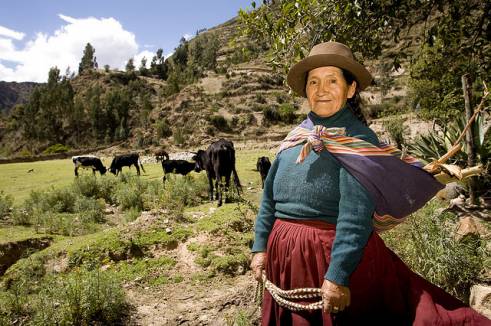By Bharat Azad
To mark Human Rights Day today, HelpAge has published new research that reveals the diversity of discrimination faced by older people around the world.
We carried out surveys in Mozambique, Peru and Kyrgyzstan, asking one hundred older people in each country about their experiences of discrimination.

The majority of people surveyed said they had experienced at least one form of discrimination including violence, abuse, neglect, malicious accusations, denial of the right to healthcare and denial of everyday goods such as food, water, shelter and clothing.
In all three countries, older people told us of their experiences in several aspects of their lives. Across the board, older people reported:
- a lack of dignity in the way they are treated – 47% of the respondents in Mozambique and 43% in Peru.
- facing discrimination or barriers to accessing healthcare – the Peruvian respondents faced particularly severe challenges, including not having healthcare within 30 minutes travel time, being denied treatment because of age and given worse healthcare because of age.
- pensions not being enough – even though 86% of respondents in Kyrgyzstan receive a pension, 79% of them reported a lack of access to everyday essentials such as food, water, shelter, clothing and heating with 39% claiming this is because of their age.
- being refused work – 43% of the older people surveyed in Peru had been refused work because of their age.
- feeling unsafe – in Mozambique, 61% of respondents did not feel safe from crime.
- having faced financial abuse – in Peru, 68% of the older women and men surveyed had faced financial abuse.
Perpetrators acting with impunity
Bridget Sleap, Senior Rights Policy Adviser at HelpAge, who oversaw the research, said:
“Governments have a responsibility to protect women and men wherever they chose to live; whether in their own homes or in private or public institutions. Just like with domestic violence against women and child abuse, states have a responsibility to change harmful, prejudiced stereotypes against older women and men that result in violence and abuse, and to provide the support and access to justice for older women and men who have been subjected to different forms of violence and abuse.
“This does not seem to be happening, as the vast majority of older women and older men who reported experiencing forms of abuse did not tell the authorities or seek redress for it. This suggests that the perpetrators are acting with impunity.”
Busting myths around discrimination
The new survey shows that negative, ageist stereotypes are prevalent across all different social, economic, and cultural contexts.
The research dispels a number of myths:
- Discrimination on the basis of old age is not just confined to things such as employment. The results of the survey suggest that discrimination cuts across every aspect of older women and older men’s lives.
- Ageist discrimination is not limited to any particular culture or society. Regardless of where they live, older women and men can be subjected to negative, prejudicial attitudes because of their age.
- Elder abuse is not just a private, family matter but a public concern. While the vast majority of older women and men in the survey reported experiencing violence and abuse at the hands of family or community members, very few are reporting this to the authorities or getting any support. This makes it a public concern.
A new independent expert on ageing
This new research comes as UN member states, international NGOs and campaigners await the appointment of the first independent expert on the enjoyment of all human rights by older persons.
The new appointee will take up the post in March 2014 and will begin the long overdue task of assessing the situation of older people’s lives from a human rights perspective. The new mandate will deepen our understanding of the unique challenges that older people face in relation to their rights and the measures needed in both law and practice to effectively respond to these challenges.
The new independent expert is recognition by UN member states and the Human Rights Council that the existing international human rights framework has not adequately addressed this area of human rights.
Calling for a convention
HelpAge and our Age Demands Action campaign are calling for a new convention on the rights of older people in order to bring about a paradigm shift in the protection offered to older people who face discrimination and rights violations.
A convention would have a positive impact on protection in law, budget allocations, societal attitudes and how the world treats older people.
